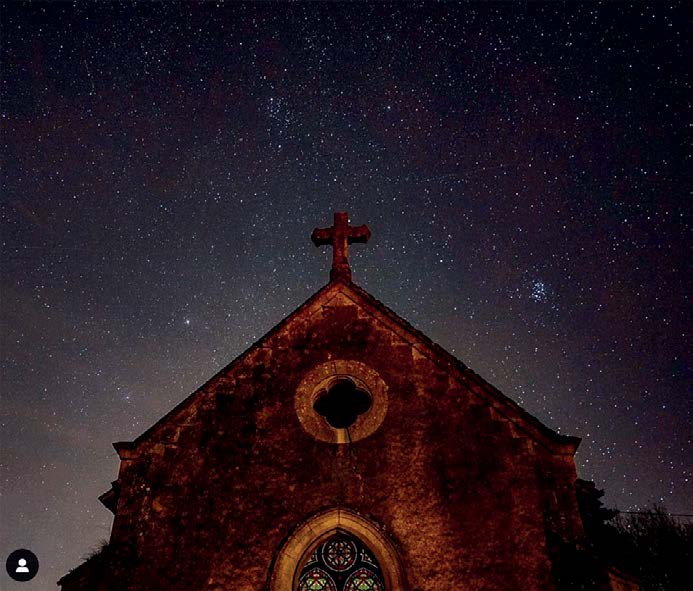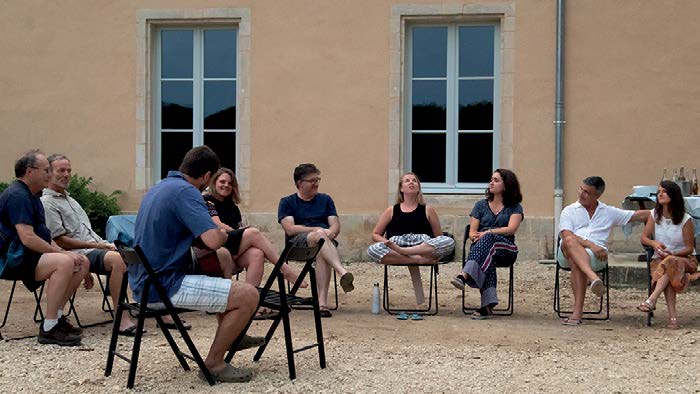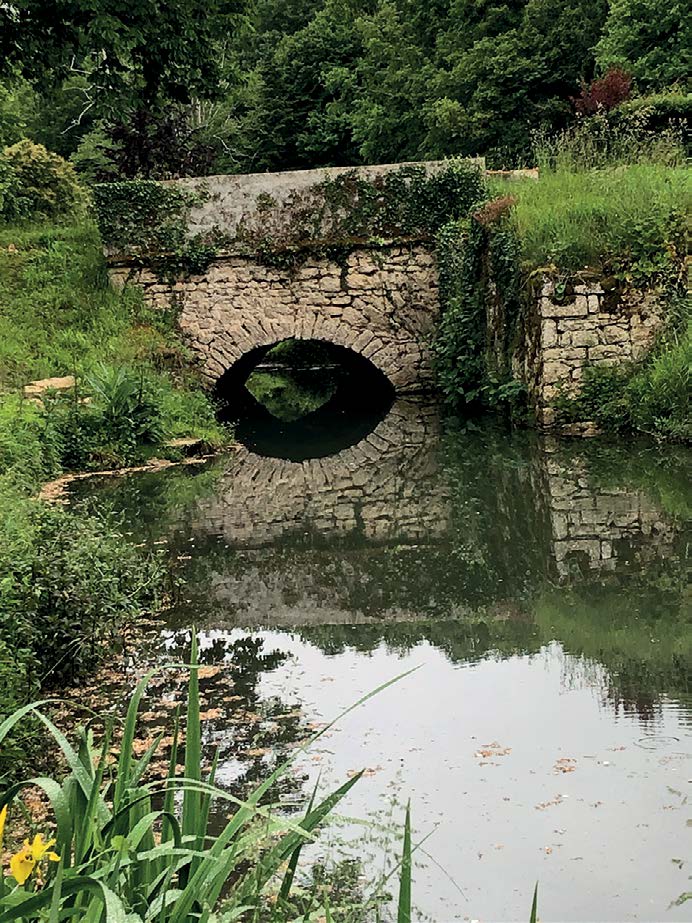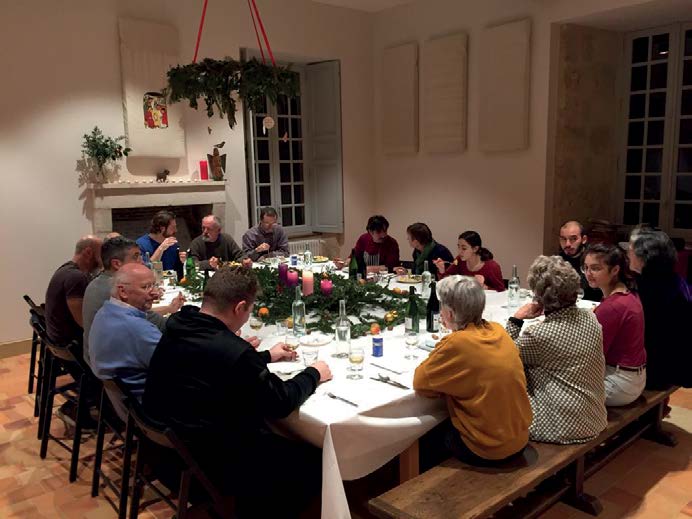Dearest friends,
There is a memorable scene in the movie ‘The Two Popes’ which describes the crisis of the Catholic Church through the conflicting personalities of Pope Benedict and his successor Pope Francis. Despite deep differences of opinion and temperament, they discover a unique kind of friendship, a commonality of concern for the wounded church and a way of collaborating with their contrasting gifts for its healing. The scene I have in mind happens at a back-door to the Vatican, where Benedict is saying goodbye to the future Francis having told him he intends to resign and so open the way for a new and radically different leader. They are both old men. Impetuously the hot-blooded Argentinian takes the stiff German intellectual in his arms and teaches him to tango while the Swiss guards look on in amused astonishment.
Real change occurs, not with solemn pomposity, clinging to all our old kinds of self-importance, but in a spontaneous rush of abandon where joy recklessly sweeps us over the watershed moment. We hardly dared believe we could survive. But we did and everything we knew has changed.
For me, these lines from WH Auden capture something of the relief and freedom of such unexpected, undeserved redemption:
“In the deserts of the heart Let the healing fountain start, In the prison of his days Teach the free man how to praise.”
How can we approach this new decade with this freedom of the spirit and hope and yet be rooted in the sharpest realism? Today there is a lot we should be intellectually pessimistic about – because otherwise we drift in denial and false hopes. But there is also a source of optimism found only through true, that is to say ever-surprising, faith born and reborn through doubt and struggle.

At a time when so many are rootless and untrusting of all belief, can we find a new innocence, a way both to believe and to belong? It is an important question. (A young visitor told me recently he had grown up in a comfortable home that was also a ‘spiritual orphanage’.) If we don’t listen to the question we may drift into the cynicism and isolation that underlies much of the bitterness and self-destructiveness of our time. W.B. Yeats, the poet on whose death Auden wrote those lines above, saw our cultural crisis originating in the desolation of civilisation after the First World War: ‘Things fall apart; the centre cannot hold; mere anarchy is loosed upon the world…the best lack all conviction while the worst are full of passionate intensity’. In this dangerous, chaotic period of human evolution, can we re-centre ourselves, reuniting conviction and intensity, to reform not just the church, but humanity?
This is the time of the year, after the excessive consumption of the holidays, when gym membership surges. Good resolutions abound. We are preoccupied with competing lifestyle choices. How can we make ourselves healthier and happier? These manufactured choices create products which embed us in even more consumption, which is a large part of the problem they are trying to solve.
A healthy lifestyle may – or not – include working out, diet and career changes. But it must include the spiritual dimension. By this I mean that aspect of human experience, which is open to the transcendent while remaining rooted in the material world and the body. Spiritual experience is betrayed if it becomes a consumer product, a tool or life-style ingredient. If we truly recognise the spiritual realm, our life in all aspects is transformed. We do not ‘construct’ an authentic lifestyle as we choose a haircut or a new car. We find it. It finds us. Finding happens when we risk. The greater the risk, the greater the authenticity. If we are not prepared to lose our life (this is the risk), we may mistakenly seek refuge in the lives and social patterns of others. Fleetingly it may feel like a good fit, but we do not find our own life, our true self. Faith is another word for this existential risking of ourselves, in obedience to the call to wholeness, to transcendence and self-knowledge, that is at the core of all human identity
Christian lifestyle, then, is not a brand. It is all-demanding and allfulfilling. In risking ourselves we find the kind of life we can and are meant to follow, the kind we are best suited for even if it is not the easiest. Opting for this, we can handle the inevitable doubts and failures that follow every choice. But we also find that everything we need to complete the process is already given, often creeping up from behind us and tapping us on the shoulder. When we turn around we find what we are looking for. And what we need. On this path we find the teachers we need. We meet fellow-pilgrims, and discover not just new friends in abundance but new forms of friendship we had not previously even imagined. Not least, we discover the work we are meant to do.
The younger generation today often seems better able to grasp these aspects of the Christian life than their parents. They can see inspirational vision in the gospel revelation, but are less interested in orthodoxy or belief than in orthopraxy, right action that harmonises with faith. They connect to a vision of human wholeness and meaning in an incarnational transcendence that brings God and humanity not only into relationship but into union. There are glimpses of this in the early church communities, the monastic movement and in the array of uniquely holy people who illustrate this – human beings who became fully their unique selves, saints like St Benedict or St Francis, Mother Theresa, Simone Weil or John Main.
There is no single brand of Christianity. It is not an ideology. It allows truth to emerge. It does not compete: it completes. But, with all the institutional baggage and social upheaval to contend with, how can the spiritual tides of the Holy Spirit be released? Not by a church that conforms to the corporate model and wastes its energies on the trivia of religious politics. The spiritual search can so quickly descend into complaint and bickering. Ramana said ‘People come to the ashram looking for enlightenment. Within two weeks they are preoccupied with ashram politics’.

What Bonnevaux has been teaching me these past few months is that the way forward is a new style of collaboration between the generations. It is not about ‘reaching out to young people’ or ‘getting the message over to them’ as it is often described. Listening to the young people who come here, I sense it is about a partnership that has nothing to do with the stereotypes of the generations peddled in the consumer culture. Bridging the generations is essential if there is to be continuity, continuity across the river of time delivering stability with radical change.
Collaboration between experience and innocence generates different streams of wisdom – the wisdom of the young (the theme of this year’s Monte Oliveto retreat) complement ing the wisdom of the elders. The world needs both, one specialising in risk, the other in forgiveness and recovery. Our world is horrendously deficient in all wisdom. The major religions should be wisdom channels, rising from the unbounded dimension of interiority, speaking from silence and yet pouring into our mundane, daily world of measurements and limitations.
At Bonnevaux we have a number of springs. One I always feel especially present to is at the end of the valley, beyond what we call the Easter Tree. It bubbles up through a tiny aperture in the ground; it is visible only as a minor disturbance, bringing small particles of earth with it as it breaks into the visible world. It is continuous and it is the source of a flowing stream. An ancient presence resides there with residual signs of human construction around it because it must have attracted people there, as wisdom itself does, beyond memory. Religions where the spring of wisdom has been blocked become mere structures of dogma and ritual, competing with each other or secretly thinking of each other as enemies.
Jesus spoke prophetically – and paid a high price for doing so – against such religion. Yet he did not reject ritual or the belief systems of religion in themselves: he wouldn’t have said ‘I am spiritual not religious’. We need living symbols and intellectual clarity to guide us to the cliff-edge of silence. At that frontier silence absorbs them. But Jesus did call us to ‘worship in spirit and in truth’ as a higher goal, as he put it, than ‘this mountain or that mountain’. The meditator, practising in any religious tradition, inevitably comes to understand this truth and strives to balance the contemplative with the external forms.. At Bonnevaux, for example, we have simplified the divine office which is the frame in which we meditate during the day – except for the first meditation of the day which stands by itself beginning and ending only with the sound of the bowl. At the other sessions we have chant and short scripture readings, from biblical and sister traditions, to highlight that meditation is within the contemplative tradition. John Main said we enter this tradition every time we sit to meditate.
Bonhoeffer said that today we need to focus intently on prayer and righteous action. The collapsing model of institutional Christianity is an opportunity to make this a transformative re-focusing. The collapsing and the transformation are undeniable and unpredictable. But they are not instantaneous and so we have the time to select wisely what we need to save and what we need to let go of. Some things are essential to continuity. But nostalgic attachments to old religious forms are not the same as the core eternals. In our period of Christian history we are learning to sift the wheat from the chaff so that a new and potent expression of Christian unity can emerge. The old denominational labels in which so much religious ego is still invested are coming to seem outdated, even small-minded, beside the panorama of the universal Christ which is already appearing as the next stage of our evolution.

Christ influences the course of history: not by supernatural interference with the laws of the cosmos but by the unaggressive intervention of his presence through the sources of wisdom. Wherever there is a living wisdom stream Christ is active. It enters our world of time and space especially through the example and the deep, silent passion of people of faith and good will. These are the true teachers of wisdom, most of them hidden. They do not look for acclaim, for security or status or even for certainty. They live the secret of servantleadership which is the only way to exercise power in a way that does no evil. They embody discipleship as the most intimate and complete of human relationships and through self-knowledge see how we are chosen before we can choose. They learn to handle uncertainty with humour, confidence and joy. Even in suffering they are not wholly separated from the eternal fun of the spirit. And when they risk themselves in total commitment they find the unique set of skills and talents allowing them to flourish beyond the limitations of their ego.
Not everyone has the same degree of talent, but each person has the genius of uniqueness and an unlimited capacity for selflessness. This is uncovered not in the self-cultivation of a lifestyle but by hearing the call that unites us uniquely to the whole. By accepting our calling we find our authentic style of being in the world and of working with others for the greater good. We can hardly be ourselves outside the community of seekers we call the body of Christ. ‘He comes to us hidden and salvation consists in our recognising him’. For this recognition we need to feel the connection between love and ascesis.
What we often call love can be the hungry, craving of our loneliness for comfort and possession. When it is disappointed – by whoever we projected it onto – our self-centred ‘love’ can quickly turn to anger and despair. To navigate beyond this cycle we need ascesis, the personal discipline of exercising our capacity for attention. Eventually this capacity becomes ego-transforming love. Paying attention to the real, not to our illusionary version of reality, illustrates why truth sets us free, equally to love Meditatio Newsletter January 2020 www.wccm.org 5 and to be loved.
The connection between meditation, (the essential ascesis of the Christian life) and love (the source and goal of wisdom) is like a cord that draws a curtain in a darkened room and allows the divinising light of a new holiness to flood in. The new holiness for our time is the recognition of God in all the conditions of our age, without nostalgia and tuned with all we have learned about human nature and the laws of the universe. It is a universal not parochial holiness. It doesn’t depend on human approval but on the mutual recognition that occurs between ourselves and God in the contemplative state. Its offspring is the ecumenism of all faiths.

Based on the pattern of history, we can guess that the renewal of Christian life will be achieved when a critical mass of disciples has learned how to navigate the perfect storm of our present crisis. The crisis is our opportunity for breakthrough. Seeing this allows us a glimpse into the process of reform unfolding within the collapse of the old structures. It builds confidence to deal with the massing powers of darkness because we see not only their capacity for havoc but their intrinsic superficiality and falseness: the brazen denial of truth, the eye for eye, tooth for tooth politics that undermines justice, the deceitfulness of the gospel of prosperity that blasphemes against the Holy One.
What allows us to commit to the way of truth and renew the gift of self? How do we start any good work and prevent the ego from hijacking it?
By discovering the true nature of love. We cannot find this without going into the desert of solitude, renouncing possessiveness and triumphing over the demon of loneliness. Over time this is the work of contemplation leading us through failure into humility. Meditation leads us directly into the wisdom of the twin process of transcendence and incarnation. If it were less than this wouldn’t everyone meditate just for the benefits they get out of it. It is discovering how much we can gain that cannot be possessed, how much we can shed and be freed from that makes the pilgrimage challenging. Meditation restores the wisdom we have lost of the link between ascesis – training in the discipline of selfless attention – and love.
This is the lost chord in the music of humanity we have continuously to recover. Quite simply and directly, learning to meditate teaches that to find we need to lose. To know the truth that sets us free from illusion we need to see ourselves in others and others in ourselves. Jesus insists there is nothing to fear in this. Rumi saw it too when he wrote ‘In the ruin of heartbreak you find the diamond of divine passion that can resurrect the dead’.
If the different generations of the human family can join hands, collaborating in this deepest and most human of all types of work, restoring the meaning of good work, a revolution will happen. The inner-outer revolution that Jesus initiated will be taken to its next stage. To highlight this we have called our new weekly WCCM Podcast ‘Contemplative Revolution’ because it is not less.
John Main said that the greatest need for our time is for men and women of deep prayer. Meditation creates the community in which young and old can relearn the meaning of pure prayer. In mutual support we can begin and complete all stages of a journey of personal transformation that leads to the transformation of the world. By degrees and at different speeds, to be sure – but for sure. May our daily practice this New Year 2020 provide us with daily insights into what wisdom is doing all around us and for us. In our meditation groups and in all the ways we share the gift, may we grow a little wiser, for the sake of others, as we learn through love to embrace the grace of discipleship frees us from ourselves so that we can be ourselves.
With much love,








